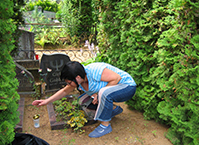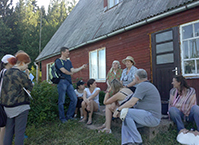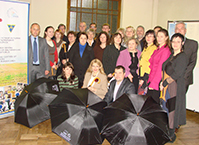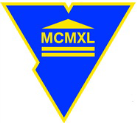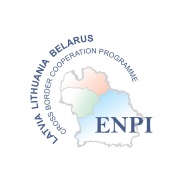Аbout belonging to communist
Categories: Man and authority, Anton Slishan
Story-teller: “When I attended school, there were no Octobrists yet, I, together with Leonards Lazdiņš, flatly refused to join the pioneers. He is now an artist in Rēzekne, he finished school in Rēzekne, he used to be a poet, a poet of love and protest, as I call them, but the guy is a bit…, you see. For our school to get the name of a pioneers’ school, the principal called all the pupils together and in front of everybody, he himself knotted our pioneer neck-clothes. Thus we were forced to join the pioneers. It was important for the principal that our school would be named a school of pioneers.
I was confident when I joined the Komsomol. I had read Ostrovsky’s “How the Steel was Tempered”, you see, people suffered so much for the Soviet power and I won’t join the Komsomol! I joined it with confidence.
I didn’t join the party, as I saw what those party men were – absolute winebibbers, as my mother said, extreme fuckers, I was categorical not to join! But in 1971, they were regularly coming to my place for half a year. They presented examples: look how it works in Lithuania, all the young people are joining, what will happen if you don’t join, who will come afterwards, who will take over the power? I joined! And I seceded, when everybody did.
And while I was in the party I was punished four times. For what? Because I wanted to introduce the spirit of Christian morality in the party. I fought against drunkards, old bosses of the party, struggled against poachers during spawning, I called them fascists; they found for what to judge me. I was convicted, firstly, because I had put on the suit made from the cloth sent by my mother’s brother from America. I was convicted also for the fact that my mother’s sister’s friend was a nun, the mother was ill, and that woman helped to weed the garden; I was said to exploit her. I was convicted for the fact that I wrote about Boļeslavs Koklačs in the regional newspaper. In the times of Latvia, until Ulmanis’ coup, he was at first the cashier, then the head of the Red Cross treasury of Latgale self-governments and education employees. And under his supervision the rest house in Ezernieki was built. He was the Latvian Red rifleman, but in Latvia’s time he was the leader of Aizsargs’ department, the coordinator of Mazpulki [the scouts], and me, I wrote about him. He helped me to maintain Līgo [Midsummer night festivities] traditions. He could sing the whole night through, there came young people and did not sing or sang just a little or danced, but he could sing all night long, to sing Līgo songs together with the women. And I wrote him a sort of a song of praise. For he, an old rifleman, had contributed so much. And somebody complained! How come? How dare you to declare the former leader of Aizsargs a soviet patriot. You see! They were about to exclude me from the party. Then one man stood up and asked, what would happen if we exclude such a good worker, who would stay in the party? Those whom I had fought against, thus I was not excluded from the party! So, you see, I am an old communist. You see, I did not manage to reform the party! I did not manage, nothing doing!
Images
Audio
Researcher: Dr. philol. Gatis Ozoliņš, Daugavpils Universitāte


